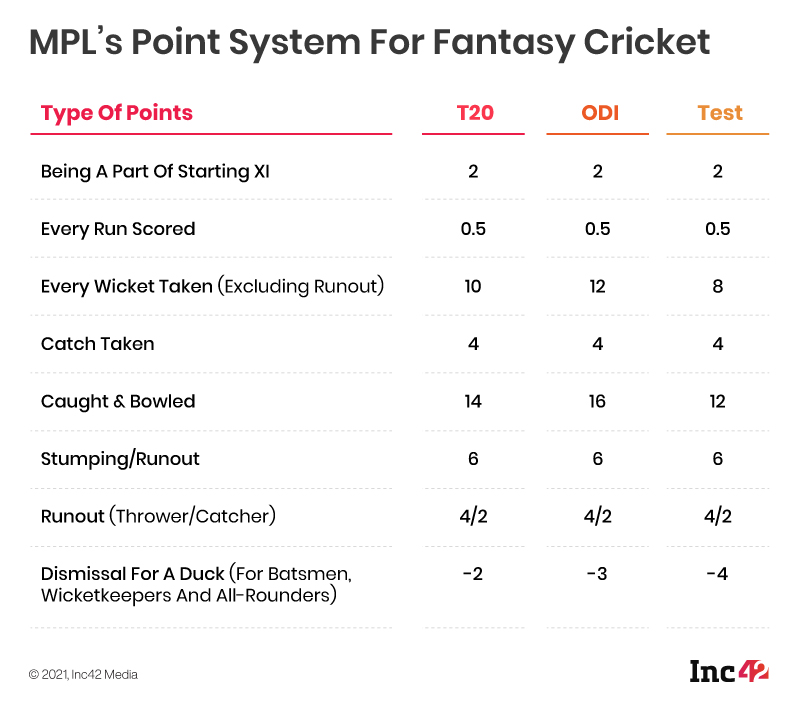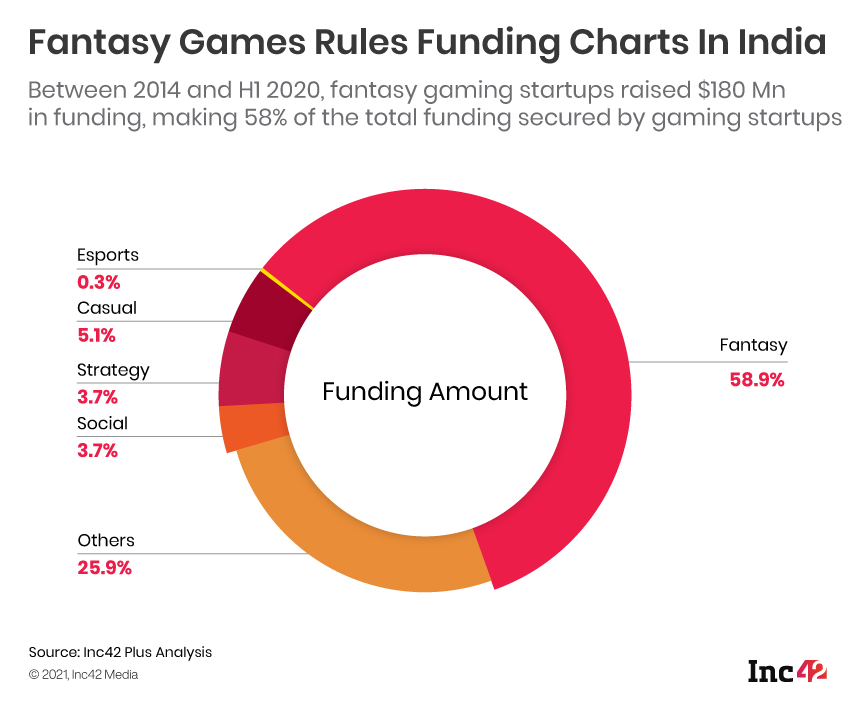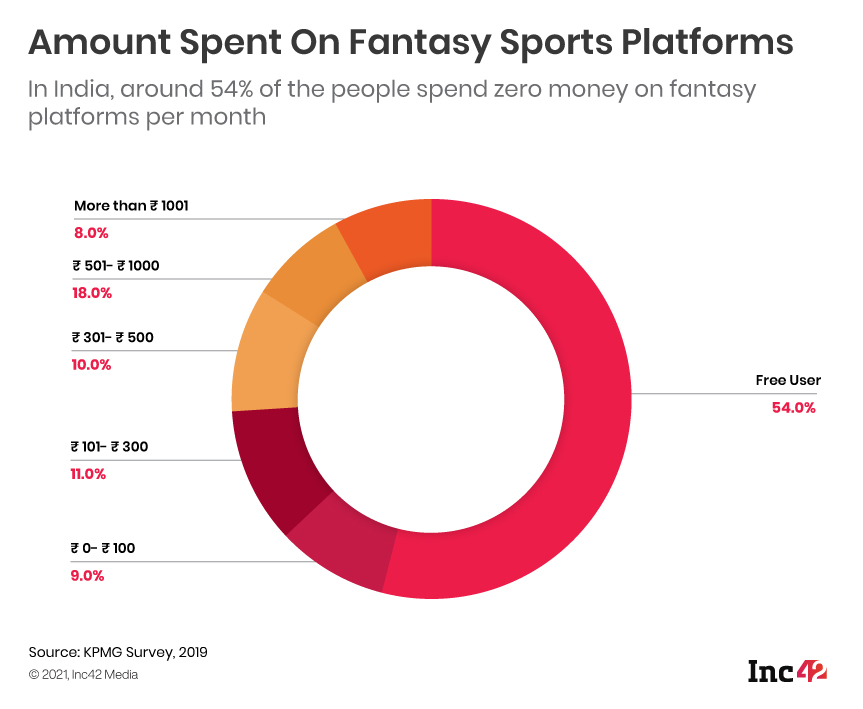SUMMARY
The fantasy sports industry has evolved to capture more than 100 Mn users of India’s 360 Mn (approx.) mobile gaming market
Even as regulators and the government are scrambling to address segment-specific issues, fantasy gaming continues to operate in a regulatory grey area
Despite regulatory issues, venture capital and private funds are knee-deep into this budding market in India, hoping to change public perception
Online fantasy sports games have been the latest craze in India. During the pandemic, with people compelled to stay at home, the cricket-frenzied nation has taken to fantasy sports platforms such as MPLL, Dream11, HalaPlay and others not just to pass the time but to try their luck in prize money. But now, it is emerging as a long-term, habit-forming engagement. The latest numbers testify it.
According to Bengaluru-based Market insights firm Valuates, the global fantasy gaming market was worth around $19 Bn as of 2020, which may balloon to around $48 Bn by 2027. A big chunk of this contribution is expected to come from India, which generated a total revenue of more than INR 2,470 Cr in the financial year ended March 2020, as per KPMG’s estimates. The consulting firm also stated that around 100 Mn active gamers came on board the fantasy gaming platforms in 2020 (most of them played on mobile), a sharp spike from around 2 Mn active users in 2016. This also means roughly 14% of the 700 Mn smartphone users in India currently engage with fantasy gamings apps like Dream11, Mobile Premier League, HalaPlay, Paytm First Games and others.
KPMG estimates point to yet another growth parameter — the industry paid goods and services tax (GST) to the tune of INR 166 Cr in CY2019, which has risen fourfold to INR 760 Cr in 2020. A PwC India report also projects that the industry has the potential to contribute a GST revenue of INR 3,000-3,500 Cr over the next five years.
A look at the current investors and investment figures also speaks volumes about the traction gained by this segment. According to Inc42’s recent report on Indian’s gaming segment, between 2014 and H1 2020, fantasy gaming startups raised $180 Mn in funding, making 59% of the total funding secured by gaming startups. Moreover, noted venture capital and private equity firms such as Kalaari Capital, Tiger Global Management, Think Investments, Kae Capital, Multiples Alternate Asset Management and Steadview Capital Management have been the biggest sources of funding to fantasy sports gaming startups in India. Finally came the icing on the cake when Dream11 won the ongoing Indian Premier League (IPL) title sponsorship rights for INR 222 Cr.
But it is too early to celebrate the rise of a niche gaming segment as legal and regulatory challenges have started to overwhelm the segment. Simply put, fantasy sports have drawn the flak and triggered lawsuits as many people consider it as an online form of betting/gambling.
Incidentally, all gambling activities are illegal in India under The Public Gambling Act, 1867, except for games that require the player to have some amount of skill. And although there is no federal law against online betting on games of skill (as against games of chance, but more on that later), each state may impose its own laws on the same. Consequently, seven states, including Andhra Pradesh, Assam, Odisha, Telangana, Tamil Nadu, Nagaland and Sikkim have already banned online fantasy sports and the NITI (National Institution for Transforming India) Aayog, the central government’s affiliated policy think tank, has taken a hard look at the segment to ensure that certain compliance guidelines would be in place.
What NITI Aayog Did And Why
In December 2020, NITI Aayog released a broad set of guidelines for regulating the fantasy sports gaming industry that has witnessed breakneck growth in the country over the past few years. The consultation paper broadly laid down several operational guidelines, including creating a self-regulatory body and advertising codes.
In the paper titled Guiding Principles for the Uniform National-Level Regulation of Online Fantasy Sports Platforms in India, Niti Aayog suggests:
- Fantasy Sports providers should honour all existing laws and regulations regarding online gaming in India.
- Such platforms should offer only skill-predominant fantasy sports formats, which are either judicially recognised or approved by an independent evaluation committee of a government-recognised self-regulatory industry body.
- Games should pertain to at least one entire real-life event.
- Money can be offered only to persons above 18 years of age and platforms should avoid offering any gambling or betting services.
This paper was released after four months of consultation and debate with the stakeholders in the fantasy gaming segment. But before we dive deep into the regulatory issues and how the segment is trying to wriggle out of the legal noose tightening around it, a close look at the nature of online fantasy sports will help clarify the current issues.
Unlike esports, which can be broadly termed as competitive video games requiring high-end hardware like PCs and consoles, fantasy sports are what their names suggest — the virtual simulations of ‘real’ sports and real-life players to create one’s very own virtual team to engage in one’s chosen sport. Most of these games are played on smartphones and do not require specific game-based skills although overall knowledge of the game and what all are happening in ‘real life’ may provide a competitive edge to the gamer.
Next come the entry fee, the competition and the earnings. While esports is played between two teams or individuals (aka pro gamers) who compete in tournaments to win prize money, in fantasy gaming, users play by selecting real-life players in a particular tournament (cricket, kabaddi or soccer) and win or lose rewards based on predicting the performance of those players. Each platform has its own point system to reward players and the top ranked player/user (with the best curated team) wins the highest prize money.


Globally, fantasy sports are not considered a part of the esports segment, which has further complicated the former’s legal status in India.
As mentioned before, the nature and definition of fantasy games have triggered a slew of controversies and court cases. In fact, the government think tank’s intervention was also focused on the legality and regulatory quagmire surrounding fantasy gaming in India, which has been unsettled for a while now. The legal debate over fantasy sports here is solely focused on whether such games require users to have a considerable amount of skills to win matches and the bets placed on them. The debate has continued since 2017 and has not neared a conclusion yet, forcing the industry to operate in an ‘undefined’ gray area.
The Regulatory Cloud
While Indian courts continue to debate about the true nature of the genre, at least two different Indian high courts (Punjab and Bombay ) held in 2017 and 2019, respectively, that fantasy gaming involved “considerable skill” to be possessed by the player and that it did not involve betting or gambling. However, a June 2019 PIL filed in the Bombay High Court claimed that the promoters of Dream11 were encouraging gambling and not paying Goods and Services Tax (GST). The PIL also pleaded to the court to initiate criminal proceedings against the gaming platform. However, the Bombay High Court quashed the petition, stating that Dream11 is “not at all dependent on (the) winning or losing of any particular team in the real-world game. Thus, no betting or gambling is involved in their fantasy games.”
These rulings faced a setback after a petition filed by the Maharashtra government late in 2019 forced a Supreme Court bench to stay the Bombay High Court’s order that had essentially given fantasy gaming platforms some semblance of legality. But ever since the Supreme Court’s order in May 2020, fantasy sports apps continue to face legal challenges from civic society members and activists.
In September 2020, a special petition filed in the Supreme Court challenged the earlier verdicts favouring fantasy gaming apps, especially the IPL sponsor Dream11, which was accused of involvement in illegal betting and gambling activities. The case is yet to be heard, but until then, fantasy gaming platforms will have to operate under legal uncertainties, which prompted Google to delist apps like MPL and Dream11 from its app store. But that seemingly has not stopped the rise of these apps in India, which in turn, compelled the NITI Aayog to take notice. In its 16-page guideline proposal to regulate fantasy gaming, it also addressed the same legal uncertainty surrounding the segment.
“Certain formats of fantasy sports have received judicial recognition in various High Courts… However, fantasy sports contests do not have independent legal recognition, having to shelter under an undefined exception to the state gambling and public order laws,” the government think tank said in its recommendation report last year.
Will There Be A Way Out?
Despite securing millions of dollars in foreign direct investments (FDI) and creating thousands of jobs over the past few years, can fantasy sports companies fight the negative perception among online gamers and dispel doubts that it is a skill-based game, not just another online gambling product?
According to industry observers, there is too much at stake even now, which leaves little scope for arbitrariness. Even the NITI Aayog acknowledged that the segment could potentially attract FDI of more than INR 10,000 Cr over the next few years. In brief, there is too much money to be made, but without clear definitions or regulations, the segment will lack the credibility that other gaming sectors command.
Meanwhile, scared of getting enmeshed in a regulatory tangle in the absence of a clear policy, industry stakeholders are exploring various channels to ensure policy stability.
A recent news report from IGN said that members of the fantasy gaming industry met with government officials to classify the segment as an esport, which is set to become a full medal event at the next Asian Games. The esports industry in India is just beginning to take shape, and globally, it has already received recognition from the International Olympic Committee (IOC) and the Olympic Council of Asia (OCA). It means that the next Olympic Games may consider eSports as a medal event, a recognition that the esports sector has been eyeing for years now.
Now that the stakeholders from India’s fantasy gaming industry are seeking the esports tag to avoid regulatory hurdles, this has left the entire gaming industry in splits. On the other hand, if fantasy gaming succeeds to gain this classification from any government body in India, the regulatory cloud hanging over the sector is likely to recede.
Plus, there is a bigger consideration. If fantasy sports ever run into legal quagmire, causing damage to their revenue models, then, the entire gaming industry in India can lose its current high valuation.
According to Inc42’s recent report on India’s gaming segment, between 2014 and H1 2020, fantasy gaming startups raised $180 Mn in funding, accounting for 59% of the total funding secured by gaming startups. The report also estimates that India has a user base of around 326 Mn engaged in mobile gaming, out of which 100 Mn engage in fantasy sports.

Can Fantasy Sports Be Equated With Esports?
When asked by Inc42 whether fantasy sports platforms like Dream11, MPL and others feature the components of a video game (or even a mobile game), several experts from the gaming industry questioned the justification of clubbing of fantasy sports with mobile gaming.
Lokesh Suji, an esports evangelist and director of the Electronic Sports Federation of India (ESFI), is not convinced that fantasy games meet the characteristics or requirements of the video games that most youngsters start with.
“We struggle to understand why fantasy sports apps are classified as mobile (video) games. Instead, these can be defined as a gamified version of an offline sport as users actually rely on a real-word sportsperson’s performance to win points,” says Suji.
Besides, users in this space are mostly adults aged 30-40. So, their intent is quite different from youngsters of 15-18 years interested in console or PC gaming titles like CounterStrike or FIFA.
“When you play console or PC games, it is simply a form of entertainment, and there is no intent to make money. But users engaged in fantasy sports mainly play it for financial rewards or real money and not entirely because it is a form of entertainment,” adds Suji.
Gaurav Assomull, cofounder of the fantasy sports platform Livepools, does not want his segment to have the eSport tag, either. “In my opinion, fantasy sports and esports are not the same; they do not fall in the same bracket. There is a universally accepted skill level needed for players taking part in esports tournaments. But the same does not apply to fantasy gaming and you cannot club them,” he says.
However, Dibyojyoti Mainak, senior vice-president (legal and policy) at MPL, differs. According to him, the Indian esports community is not a territory controlled by a few and must be democratised.
“We need to ensure that our Made-in-India games feature in events like the Asian Games and the Olympics. Unfortunately, at the moment, even leading esports events in India do not use Indian games, let alone international tournaments. Second, esports has to be made accessible to the masses. You cannot expect to drive esports growth in India on the back of high-end, high-resolution, complex and primarily PC games that are alien to most Indian mobile internet users,” says Mainak in an emailed response to Inc42’s queries.
Mainak’s contention cannot be ignored, given that most esports events are conducted in the form of marquee tournaments that are inaccessible to most Indian gamers. For the esports industry to widen, companies need to look at the games and the tournament formats that work for India. In contrast, fantasy gaming in India has mass appeal but still lacks regulatory recognition. So, it may be wise to look at how other nations and judiciaries regulate fantasy sports.
The Saga And The Scandals
The history of fantasy sports dates back to the 1950s in the US. According to the Fantasy Sports and Gaming Association (FSGA), a US-based trade body with more than 200 members from the fantasy sports industry, the first fantasy game was devised on top of golf sometime in the 1950s, which later spread to other sports including baseball, and soccer. The point structure, in sync with golf, was developed by Wilfred Winkenbach, one of the stakeholders in the U.S, baseball team Oakland Raider (formerly Las Vegas Raiders) and eventually covered baseball in the 1960s.
Fantasy games were played offline before the internet era. According to Mashable, internet giant Yahoo! was one of the pioneers in online fantasy gaming and even made its product free in 1999 after launching it 1997. Yahoo Fantasy Sports is still operational, with more than 7Mn users in the US. As of 2021, the segment itself is valued at around $8.4 Bn in the US.
But unlike India, there is no lack of regulatory clarity in the US. The Unlawful Internet Gambling Enforcement Act (UIGEA) has banned sports betting, gambling or betting over the internet throughout the country except in Nevada. The Act, however, has specific legal exceptions for games of skill, including fantasy sports. In the UK, fantasy sports are regulated by the central government body called the Gambling Commission. The country requires fantasy sports operators to obtain licences to offer their products and has strict guidelines in place for advertising and promotions.
Even then, scams were rife. In 2015, The New York Times reported a scandal involving two of the largest fantasy sports platforms — DraftKings and FanDuel — where they admitted that an employee from DraftKings accessed player information before other users and used it to win $350,000 on the rival portal FanDuel. Some experts even called it an equivalent to ‘insider trading’. Following the scandal, the FBI and the U.S. Justice Department had to launch an official probe into the business model of fantasy sports.
Can India Deal With The Loopholes And Irregularities?
Although fantasy sports all over the globe are not immune from scandals and financial scams, the legal experts who have spoken to Inc42 think a UK-like licensing regime to address market irregularities will be far-fetched and advocate a self-regulatory regime instead, with an ombudsperson.
According to Arun Prabhu, partner (technology, media and telecom) at Mumba-based law firm Cyril Amarchand Mangaldas, fantasy sports operators in India are still innovating on pricing, revenue models and how to reward players. So, introducing a licensing regime at this point can hinder the sector’s growth. But he insists that platforms should stay away from projecting themselves as money-makers or products to win cash when it comes to advertising and promoting fantasy sports. However, this is not the only area that requires legislation.
In the absence of sector-specific regulations, government-affiliated watchdogs like the Advertising Standards Council of India (ASCI) can function as a proxy regulator of advertising and promotional activities related to fantasy sports platforms. But when it comes to regulating the actual operations, Prabhu suggests that fantasy sports operators can appoint a self-regulatory body with the power to weed out non-compliant players from the market.
He cites the Federation of Indian Fantasy Sports (FIFS) that already has a ‘constitution’ followed by all the operators affiliated with the association. Fantasy sports platforms, with affiliation to a similar industry body, can also be perceived as compliant players that choose to adhere to a set of self-imposed guidelines in the absence of actual legislation.
“The constitution of FIFS is based on a self-regulatory regime similar to the intermediary regulations for (OTT and content) platforms that came out recently. The regulator has the power to make classification between compliant and non-compliant players, and these decisions can be overseen by retired court judges appointed to the regulator,” adds Prabhu.
Assomull of Livepools suggests that the industry will be in a much better position when there is consolidation. It will leave only big players who will have to take up the responsibility to keep the fantasy gaming platforms clean and away from controversies. He adds that although the segment has a large addressable market of 300 Mn mobile gamers, only those firms that can raise large capital pools are likely to survive. The rest will have to merge, shut down or look for a large buyer. “Out of the 70+ fantasy sports platforms currently operating in India, only the top 10-15 may survive and establish themselves,” he adds.
The actual reason behind a crowded market early on is that there are quick and relatively easy bucks to be made, largely due to a lack of legal oversight. “There have been many companies in the past two-three years that ventured into fantasy (sports) and shut down within six months, nine months, 12 months, 18 months or 24 months,” says Assomull.
Prabhu of Cyril Amarchand Mangaldas concurs, saying when industry sectors like real-money gaming and fantasy sports are regulated inconsistently, small players always have an incentive to make a quick buck and move on.
“They (small fantasy sports platforms) are the ones which do not follow advertising and promotion protocols; they sell consumers the dreams of making a million dollars sitting at home. These (small) platforms are not built for long-term growth, but such bad actors can be penalised with self-regulation,” he adds.
According to Sudhanshu Gupta, COO of Paytm First Games, apart from adherence to a self-regulatory regime, operators in the space can also introduce some checks and balances to protect consumers from overspending.
“We can ensure that players do not spend more than a certain number of hours a week, and there can be weekly limits on spending. For example, when a player has a history of not spending beyond INR 100 a week and suddenly enters a pool of INR 10,000, there should be restrictions on such disproportionate spending. We should educate players that the game does have an element of financial risk,” adds Gupta.
However, it is important to note that most of the revenue earned by fantasy sports companies come from the entry fees charged to join a prize pool. Some estimates showed that fantasy sports platforms generated a staggering $14.4 Bn in revenue from entry fees alone in the US. Closer home, Dream11, which leads the Indian fantasy sports segment, generated revenues worth INR 775.41 Cr in entry fees, according to data sourced from the Registrar of Companies (RoC).
Hence, it is unclear whether the industry could add another 100 Mn players in the future if one were to remove the prize money from fantasy sports. Also, how will the revenue model work for fantasy gaming if the entry fee-prize money module is not pursued?
A quick look at the huge money flow will clarify things further. Each betting pool in a game of fantasy sports requires a user to pay an entry fee ranging between INR 50 and 4,000 or more, depending on the cash prize. Also, a betting pool may have 5,000-300,000 players paying the entry fee to join a game. Although the entire revenue model may look like a carefully contrived alternative to sports betting, the industry argues that top-ranked players do not win out of luck but due to skills.

While the fantasy sports industry claims that the gameplay is highly calculative and not speculative as seen in actual sports betting, the future of this billion-dollar sunrise sector can be in jeopardy if it does not get regulatory clearance in India.
One classic example is the current ban on the extremely popular PUBG Mobile game. The ban, imposed due to the ongoing geopolitical conflicts between India and China, had earlier shook the gaming community and even wiped out the fortunes of Tencent, the developer of the game. With millions of dollars already invested in fantasy sports, especially via the FDI route, a regulatory clean chit is a priority now for investors, founders and fantasy gamers.
Rajeev Suri, managing partner at Orios Venture, aptly sums it up. “The future of the fantasy sports industry hangs on a binary tale. The industry will either continue to live and add more users or be deemed illegal, which will essentially wipe out all valuations, which will crash to zero.
“Today, PUBG Mobile is at zero (valuation in India), and it is not likely that a reversal of the ban will bring back all the valuation. Similarly, the fantasy sports segment in this country is staring at an existential threat, and future fund flow into this segment will depend on the recognition of the segment in India.”



























